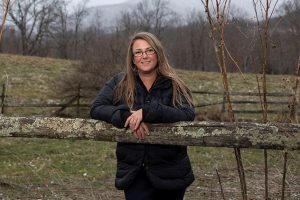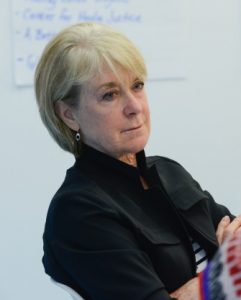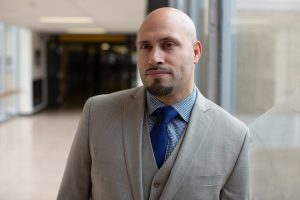Joanna Burt-Kinderman: Recognized for Leadership in Math Instruction
Joanna is Joanna Burt-Kinderman, the district’s math instructional coach. She’s introduced a problem-based system of professional development that calls on teachers to identify challenges in their classrooms, collaborate on solutions, and iterate. Burt-Kinderman, 41, who grew up in Pocahontas County and attended its rural schools, is driven by the idea that teaching math should empower students and teachers alike.
LESSONS FROM THE LEADER
- Model Coaching on Good Teaching: Teachers need a safe space and respectful community to explore ideas that won’t all be “right.” Give them challenging problems to grapple with collectively and a license to learn through mistakes.
- Give Students and Teachers Ownership: Students need incentive and support to become agents of their own learning, and so do teachers. Teachers should define the problems that need solving in their classrooms, then work together to test and revise their improvement strategies.
- Use a Strength-Based Approach: In the journey of improvement, pay at least as much attention to strengths as failures. Name, celebrate, elevate, and double down on the best of student and teacher practice.
Suzanne Lacey: Recognized for Leadership in Educational Technology
Lacey, 56, uses technology to bring the world’s resources to Alabama, but she also wants to open the wider world to her community. She’s taken students, parents, and school board members to see what project-based learning looks like in Sacramento, Calif; she brought educators to Pittsburgh to soak up innovative uses of maker spaces. Last year, Talladega middle school teachers found themselves at Google’s Sunnyvale, Calif., headquarters for specialized technical training.
LESSONS FROM THE LEADER
- Value Relationships: Tending to relationships over time is essential. Relationships you build at all stages of your career—with other educators and with business leaders and the community—are the ones you can rely on for years to come.
- Be Well-Rounded: Build your expertise in a wide range of areas to be able to impact an organization holistically. Never stop studying and doing your homework.
- Feel Urgency: Don’t take shortcuts, but a school year is only 180 days so moving with speed and purpose is important.
Roberto Padilla: Recognized for Leadership in Districtwide Equity
Padilla, a former New York City principal, is guided by his own experiences as a foster child coming of age in Newburgh. He, like so many of the district’s Latino male students, was once deemed a likely dropout destined to a life of crime and poverty. But the murder of two of his best friends in high school shook him awake, he said and set him on a path to commit his life to education—his own—and that of thousands of other children like him. Padilla has since woven equity into the fabric of Newburgh’s everyday activities and his decision making. He’s overhauled its budget and administrative staff, placing the muscle in its most destitute and academically challenged schools. And he’s started the arduous task of redistributing teachers so that its most talented educators are placed in front of the students who are struggling most.
LESSONS FROM THE LEADER
- Be Courageous: Always ask: ‘Why should anyone be led by you’? Make a list of excuses that are counterproductive, such as ‘This can’t happen here,’ and explain why they should disappear.
- Build Teams and Collaborate: Enlist stakeholders and collaborate with them often. Everyone needs to own the work. Relationships and partnerships are key ingredients to success.
- Listen to Students: Our children have great ideas and different perspectives than our own. Create authentic platforms where students can share their input and ideas.



